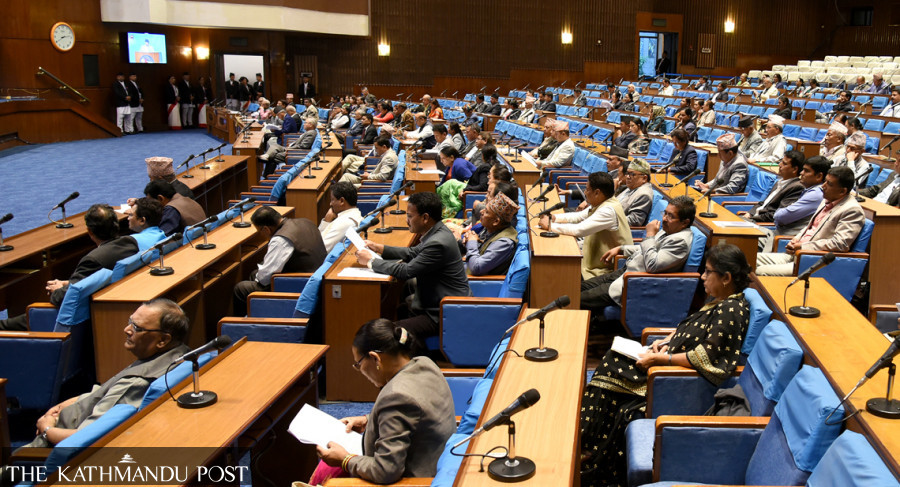Politics
Postponing House meeting without compelling reasons, a wrong trend that continues
Analysts stress need for the House calendar to end the practice.
Binod Ghimire
A meeting of the House of Representatives called for October 26 has been postponed by two days, citing that the date conflicted with the local level conventions of the opposition CPN-UML.
Issuing a notice on Tuesday, the Parliament Secretariat said the House meeting was postponed at the request of the UML.
“The Parliament Secretariat had consulted with the governing parties before rescheduling the House meeting. The House functions in coordination among the parties,” said Roj Nath Pandey, spokesperson for the secretariat.
Parliament has largely been paralysed ever since the current session commenced on September 8, owing to the disruptions created by the UML. The largest party in Parliament repeatedly tried to stymie the House meeting from the very first day in protest against Speaker Agni Prasad Sapkota's refusal to take action against 14 of its defecting lawmakers, who have now formed their own party, CPN (Unified Socialist).
Save for endorsing some bills related to the national budget amid opposition ruckus, the 12 meetings of the lower house so far have accomplished very little. The dysfunctional House has once again postponed its meeting, and incidentally, the reason is the opposition party.
Experts on parliamentary affairs say House meetings are being convened and postponed without compelling reasons due to the lack of a House calendar.
“This is not the first time the House meeting was postponed at the request of a particular party,” Som Bahadur Thapa, a former secretary at the Parliament Secretariat, told the Post. “Had there been a House calendar in place, haphazard postponements of parliamentary meetings could have been checked.”
Discussions for the preparation of a House calendar have been going on since the 1990s, but none of the leadership of the parties in government has taken the matter seriously to actually bring one and put it to practice.
One stark example of the parliament operation being dictated by the whim of a party is when the erstwhile KP Sharma Oli government prorogued the budget session of the House in July last year without even consulting with the Speaker.
In a country where democratic culture and practice have not flourished, the parliament runs at the behest of political parties, said Thapa.
“The UML should have informed the Parliament Secretariat about the party’s local level convention in time, before the date of the House meeting was announced,” he said.
The UML had fixed the dates for its local level convention weeks before the date of the lower house meeting was finalised.
Some observers, however, do not see the UML local level convention a reason enough to postpone the House meeting. They say it is wrong that the UML is mobilising its federal lawmakers to the local level convention when the country has already embraced federalism.
Taranath Ranabhat, a former Speaker, said with the House already in a shambles, the Speaker and the government readily agreed to postpone the meeting when the UML made the proposition.
“It was done at the interest of three parties—parliament secretariat, the government and the main opposition. Since the House hasn’t been particularly effective, there was no problem with the meeting being deferred,” said Ranabhat.
He said since there are no signs of the UML allowing the House to function smoothly, the government, in order to avoid further conflict, will likely play safe by adjourning the ongoing session before Tihar festival.
Minister for Federal Affairs and General Administration Rajendra Shrestha also said the House session would most likely be prorogued by the end of this month.
He said the session has continued only because the ruling alliance wants to elect a deputy Speaker.
“But the session will be prorogued before Tihar irrespective of whether the deputy Speaker is elected or not,” he said. “The government doesn’t want to continue it for long.”




 13.12°C Kathmandu
13.12°C Kathmandu














